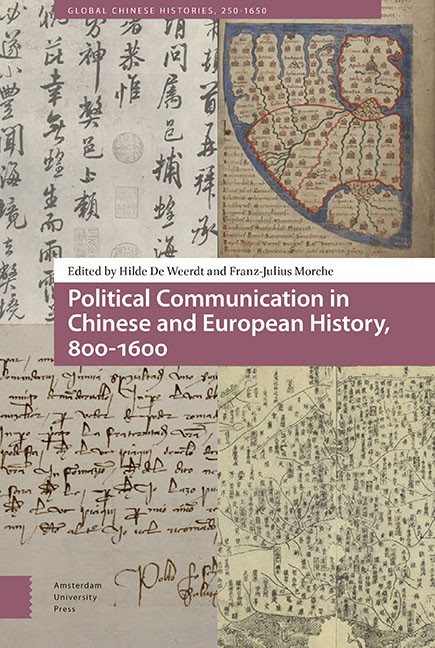Book contents
- Frontmatter
- Dedication
- Contents
- List of Figures and Tables by Chapter
- Acknowledgments
- Introduction
- Part I Communication and the Formation of Polities
- Part II Letters and Political Languages
- Part III Communication and Political Authority
- Part IV Memory and Political Imaginaries
- Epilogues
- List of Contributors
- Index
8 - Giving the Public Due Notice in Song China and Renaissance Rome
Published online by Cambridge University Press: 17 June 2021
- Frontmatter
- Dedication
- Contents
- List of Figures and Tables by Chapter
- Acknowledgments
- Introduction
- Part I Communication and the Formation of Polities
- Part II Letters and Political Languages
- Part III Communication and Political Authority
- Part IV Memory and Political Imaginaries
- Epilogues
- List of Contributors
- Index
Summary
Abstract
This chapter explores the similarities and differences in methods of conveying information to common people in two societies where printing was coming into greater use — the huge agrarian empire of Song China (tenth to thirteen centuries) and the city of Renaissance Rome (fourteenth to fifteenth centuries). The Song material is strongest on the bureaucratic reasons for posting notices and the language used in them. Authors preserved hundreds of notices, probably seeing in them proof of their serious commitment to promoting the welfare of the people under them. The sources for notice-posting in Renaissance Rome are fuller on the practices associated with circulating notices throughout the city on church doors both by the papacy and by its critics, who sometimes posted satirical or contemptuous notices at the same sites. The posting of notices in Renaissance Rome was a bureaucratic practice that had strong ritualistic overtones, was often highly politicized, and therefore could easily be subverted by critics of the regime.
Keywords: Song Dynasty, China, Rome, notices, printing, ordinary people, papacy
How does a government ensure that the populace is informed of issues that concern them? In the developed world today, many means of communication are available. Government leaders can call press conferences and leave it up to news organizations to spread word of new policies via television, newspapers, and the Internet. The postal system is also often used, for instance, to inform those with government pensions of changes in their benefits. To make sure that those involved in a lawsuit show up in court, officers of the court deliver summons to them in person, witnessing that they received the notice. In the US, civil lawsuits often require that decisions be published, with the result that newspapers, especially free ones, are filled with pages of legal notices that hardly anyone ever reads.
The means of communication available to governments in earlier times were of course more limited. Oral communication was the most basic, used everywhere, but it had its limitations. Those not present when an announcement is made might get only a distorted, hearsay version of it. With writing, the means of communication were expanded, as recipients did not need to be gathered together to hear an announcement.
- Type
- Chapter
- Information
- Publisher: Amsterdam University PressPrint publication year: 2021

